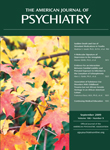Re-Feeding-Induced Hypomania in an Anorexia Nervosa Patient With Hyperthyroidism
To the Editor: Hyperthyroidism has been noted to have various effects on patients with anorexia nervosa, ranging from promotion of weight loss to binging, purging, and weight gain (1) . Moreover, both anorexia nervosa and hyperthyroidism have been associated with bipolar affective disorder (2 , 3) . We present the case of an anorexia nervosa patient with hyperthyroidism who developed hypomania during re-feeding.
“Ms. Y” was a 43-year-old woman who had given much attention to her stature and body weight since her teenage years. Most of the time, she weighed 48 kg, which was appropriate for her 155.5-cm height (body mass index: 19.85 kg/m 2 ). Several episodes of dysphoric symptoms had been noted since her early 20s, during which time she ate large amounts of sweet food and later engaged in more vigorous dieting to keep her weight low. She was diagnosed with Graves’ disease at age 40 but had poor adherence to her antithyroid regimen and allowed the persistent hyperthyroidism to decrease her weight over time. Thereafter, she weighed approximately 36 kg. Amenorrhea later ensued.
The patient experienced a hypomanic episode with spontaneous remission at age 42. Shortly before admission to the hospital, she engaged in more vigorous house cleaning to affect a weight loss of 32.5 kg (body mass index: 13.53 kg/m 2 ). She then developed symptoms of dyspnea on exertion, general weakness, palpitations, and hair loss. She was admitted under the impression of anorexia nervosa and hyperthyroidism.
Radioimmunoassay revealed an elevated free thyroxine level (>4.20 ng/dL; reference range: 0.6–1.6 ng/dL) and decreased thyroid-stimulating hormone (<0.15 μIU/ml; reference range: 0.2–3.3 μIU/ml). Propylthiouracil, 375 mg daily, was prescribed, and her free thyroxine level decreased to 1.86 ng/dL 2 weeks later. She began to exhibit rapid weight gain (1.5 kg per week) and reached 37.7 kg 1 month after admission, under a dietary intake of 1,500–2,000 Kcal per day. She experienced another hypomanic episode, and the associated free thyroxine level was found to be high (>4.8 ng/dL). Propylthiouracil was increased to 450 mg daily after we carefully ruled out the possibility that the patient covertly discontinued the drug, and quetiapine, 25 mg daily, was added. Her hypomania resolved 10 days later, although the hyperthyroidism remained. She then began to insist on being discharged and weighed 36.3 kg at the time of discharge.
After an initial response to antithyroid treatment, our patient exhibited rapid weight gain, developed hypomania, and had relapsed hyperthyroidism. We postulate that a re-feeding-associated increase of thyroid hormone contributed to the development of hypomania (4) . This case report suggests a more conservative approach in dietary supplementation and rate of weight gain for anorexia nervosa patients with hyperthyroidism during the re-feeding period. The observation that hypomania subsided rapidly using low-dose antipsychotics also suggests that hyperthyroidism-related hypomania may be self-limited.
1. Birmingham CL, Gritzner S, Gutierrez E:Hyperthyroidism in anorexia nervosa: case report and review of the literature. Int J Eat Disord 2006; 39:619–620Google Scholar
2. Nath J, Sagar R:Late-onset bipolar disorder due to hyperthyroidism. Acta Psychiatr Scand 2001; 104:72–73Google Scholar
3. McElroy SL, Kotwal R, Keck PE Jr:Co-morbidity of eating disorders with bipolar disorder and treatment implications. Bipolar Disord 2006; 8:686–695Google Scholar
4. Moore R, Mills IH: Serum T3 and T4 levels in patients with anorexia nervosa showing transient hyperthyroidism during weight gain. Clin Endocrinol 1979; 10:443–449Google Scholar



